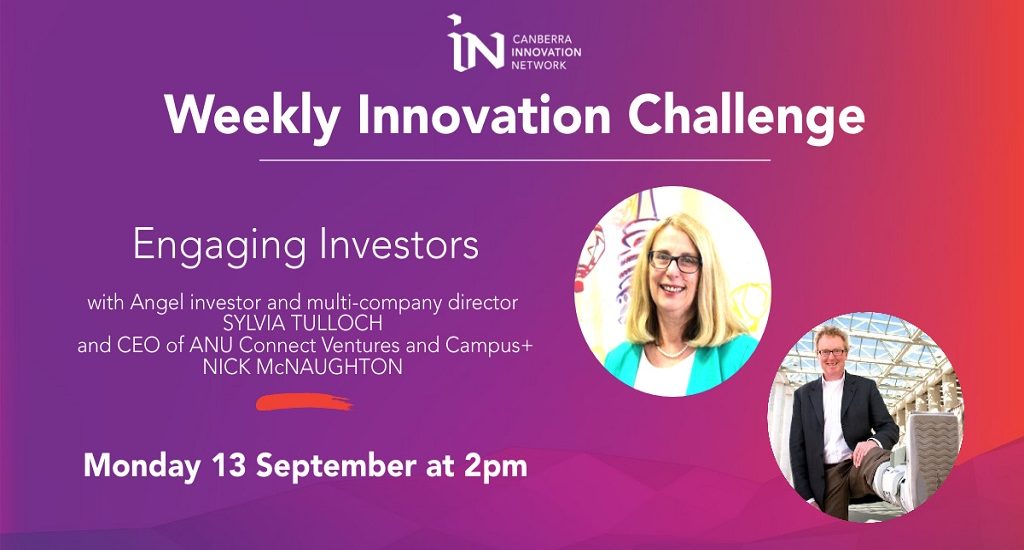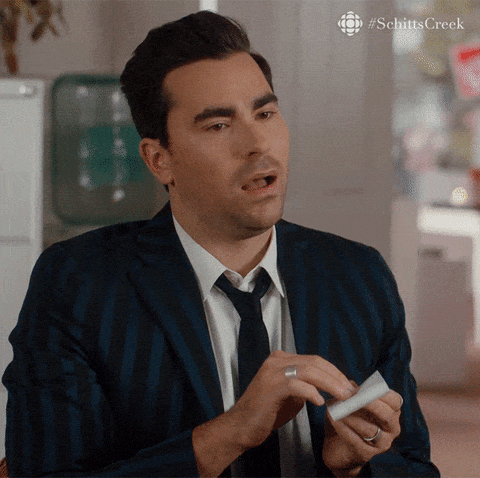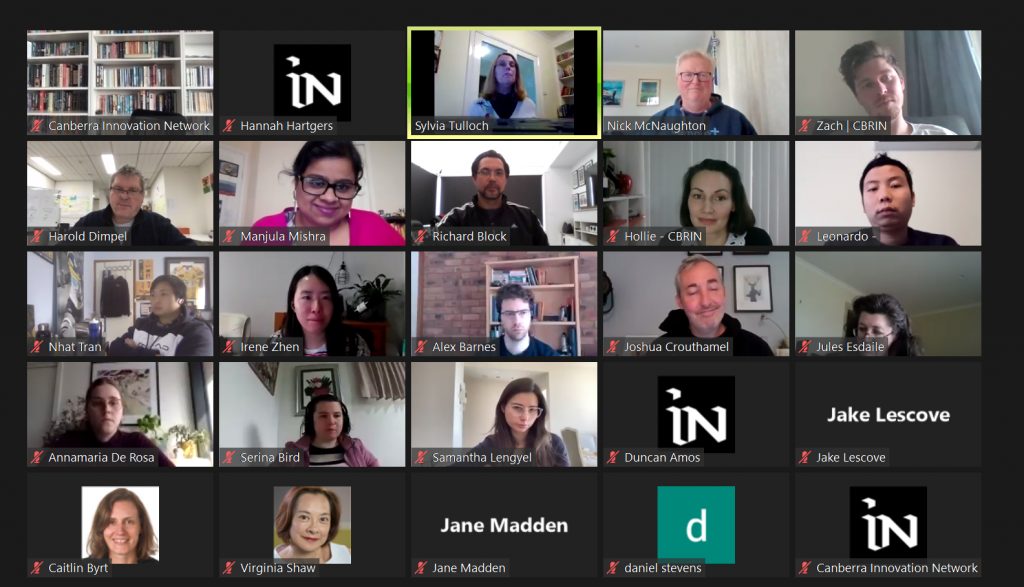- 14 September 2021
- Posted by: Canberra Innovation Network
- Categories: General News, Weekly Innovation Challenge

As part of the Canberra Innovation Network’s commitment to supporting our community of entrepreneurs during the ACT lockdown, we’ve reinstated our popular Weekly Innovation Challenge. The Weekly Innovation Challenge is for every entrepreneur, founder and business leader. If you’re growing a business, developing a product or just want to change the world, our goal is to show you relevant new ideas and challenge you to rapidly try them out. Every Lockdown Monday at 2pm we will introduce a topic, host guest experts, allow room for questions and end by setting a useful, actionable challenge for you to work on.
In the fourth instalment of the Weekly Innovation Challenge we hosted a discussion with investors on Engaging Investors. Friends of CBRIN Sylvia Tulloch and Nick McNaughton outlined the do-s and don’t-s that come with accepting money from others, and also gave some invaluable tips on seeking out those funds during COVID. A big thank you to everyone who participated, and be sure to register now for our next weekly challenge — a Masterclass in Accounting for Startups, hosted by Harry Hoang.
NB: Below we share notes taken from the live meeting. This is not a transcript and these are not direct quotes; for those, refer to the video above.
Welcome to #4 of our Weekly Innovation Challenge series! These one-hour webinars are meant to help take you outside of your day-to-day while giving you some fresh thinking and support.
This week we’re pleased to be joined by Sylvia Tulloch and Nick McNaughton, both seasoned investors with experience asking for and handing out seed money.
Let’s get right into it.
A few key things to realise:
- People don’t always invest after one exposure to a company
- You can’t let your feelings be hurt when someone tells you ‘no’
- Not all money is good money

Sylvia says that one of the unexpectedly great things about taking on investors is, in addition to getting their money, you get people who are super eager for you to succeed. If their cash is behind it, they want you to win! Also, don’t take it personally when investors make decisions — they have their own reasons and access and timing and areas of expertise and rules they set.
Nick would like you to know he’s no longer in a moonboot, and that it is very, very important that you find smart money rather than dumb money (smart = cash that comes with domain expertise, networks and industry experience). Otherwise you’ll spend a tremendous ammount of time educating your investor, and they can veer your business away from where you want to go. And make sure you know when you’re talking to one investor you’re potentially speaking to two, or three, or four; people like to invest alongside others, and will share your story. When you get someone onboard, consider saying, “Who else do you know that I can potentially get onboard?”
Story time! Sylvia invested in a sapphire mine in Central Queensland and learned a lot about gem marketing (sales are done with actual bags of USD). The investment led to other elements in the mine, and as the investors were a bunch of people who invested together and trusted one another they were all in for the journey and learnt from it. Nick likes to check up on the people he invests in by seeing if they are in the office at the start and end of a Friday, and what kind of car they’re driving. After catching one guy with a fancy new ride, trust was broken forever.
More tips …
- Set the communication cadence at the beginning
- The more investors you have on your share register the more required of you, so set the bar of what you’ll deliver. Consider once a quarter via pdf. You can substantiate that with a 1hr Zoom call once a quarter, at, say, 4 or 5pm three days after you submit the shareholder report in which you reiterate the key points on the pdf. What’s gone well / not well / what next quarter will look like — this will really establish trust, and let your investors know you know how to course correct
- Let’s focus on bad news
- If there’s a problem, you must address it rather than thinking you should wait until you’ve fixed it, because by then the communication is broken
- Your investors are there to help, so they might be able to solve your problem with an introduction or similar
- Don’t approach them with just a problem, however; come to the group with three options, each with pros and cons
- Not all opportunities are built for other people’s money; learn the difference before sticking your hand out
- Don’t judge a book by its cover
- Some of the wealthiest people don’t present as such

How do I qualify an investor?
- Look for founders who challenge you!
- Ask “how many deals have you done in the past two years?”
- What’s good about this question is they will splutter if they’re a rookie, and if they say “2 or 3” you can ask further what their actual investment was — “50, 100, 150k?” That way they know you aren’t after a couple thou. Then ask if you can reference check the investor by checking in with the founders they did invested with
- Always reference check who you’re doing business with!
- What’s good about this question is they will splutter if they’re a rookie, and if they say “2 or 3” you can ask further what their actual investment was — “50, 100, 150k?” That way they know you aren’t after a couple thou. Then ask if you can reference check the investor by checking in with the founders they did invested with
- Finding out more about your investors is very important; it’s a long journey and you must know the people you’re sharing the lifeboat with
- Rather than asking friends and family to directly invest, you can ask if they know anyone
- Be hesitant when taking money from friends and family
- Don’t ever take money from someone who can’t afford to lose it
- Avoid narcissists at all costs because they’ll drag you away from your path
- Avoid litigators because you don’t want to have to deal with legal threats
- You qualify a bad investor the same way you’d qualify a bad person
- Be careful taking money from lawyers and accountants
How does COVID change things?
- It doesn’t! Though you can’t personally interact, the process is the same as in person.
- The process now is very efficient! And people are a bit more open to risk. The 1920s were a great time for investment in progressive, left-of-field, innovative ideas. We predict now will be similar — a golden decade of entrepreneurship!
- In the Zoom / COVID world you DO need to be more organised about followups, and be prepared not to close on the first convo
Sole founders? Not necessarily a good idea. The technical god and the sales god are normally two different people, and one person needs to work on the product while the other on selling it. If there’s a single person, you need to believe in their commitment to growing the team.
Don’t view rejection as “rejection” — it’s about finding the right match. Listen very carefully to the reason behind the NO. You learn the best lessons from hard news.
There’s never been a better time to raise startup investment in Australia than right now.
How do I start investing?
- Consider teaming up / joining a group so you can learn about how to invest with smarts
- Don’t invest in the first thing that comes your way
- Don’t think of it as making one or two investments, then seeing money — you need to spread the risk
- Don’t invest until you’ve paid off your house. And paid off an investment property. And pumped up your super. And paid off your kids’ education.

Remember to join us next week when Harry Hoang will host a Masterclass in Accounting for Startups. See you on 20 September at 2:00 PM!
Weekly Challenge: Have a hard look at what you can offer a potential investor and decide if you’re ready, or need to do some more work first. Once you’re ready put together a dream list of a half-dozen investors and practice your pitch on a mirror and on your lockdown bubble.
Week 3: Sign up for one of the free trials mentioned above and test it out on your site. If you’re averse to that, identify a friend who isn’t familiar with your site and give them the five-second-challenge, then implement a change you learn is necessary from what they spot.
Week 2: Identify the ONE thing you can do better for your customers, and just bloody do it!
Week 1: Realise one problem I have and share it with someone I trust (“I’m not sure what to do about XYZ” or “I’m worried about ABC”). Saying it out loud is sometimes all I need to do! But other times the input from my team, a friend or another member of the innovation community with an understanding of my industry is just what I need to solve this.

